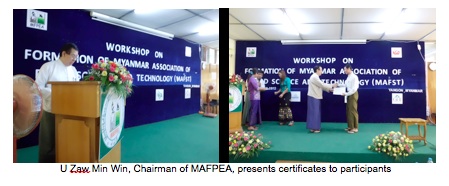Alastair Hicks
Introduction
A meeting was held in Myanmar at the Logistic Training Center, Myanmar Port Authority Compound, Yangon from 23-24 November 2012 for the formation of the Myanmar Association of Food Science and Technology (MAFST), under the auspices of the Union of Myanmar Chamber of Commerce and Industry (UMCCI) and their member Myanmar Agro-based Food Processors and Exporters Association (MAFPEA).
Purpose and Scope
MAFST was established as a professional association in Myanmar, with a generic Constitution in line with the other members of the Federation of Institutes of Food Science and Technology in ASEAN (FIFSTA). The meeting was arranged through the UMCCI member, Myanmar Agro-based Food Processors and Exporters Association (MAFPEA), to discuss the MAFST formation and constitution, with discussions held between the private sector, the Associations of UMCCI, academics and teachers of food science and technology, and concerned government officials from ministries related to the field.
The generic Constitution provided (since 2002) has been translated into Myanmar language by Daw Win Win Kyi to ensure accuracy. The final document and outcome of the meeting will be submitted through the Ministry(ies) by the MAFST official(s) to obtain clearance at appropriate levels for MAFST establishment and registration.
Once registration of MAFST is completed, this finalises its membership of FIFSTA. This enables MAFST to hold professional technical meetings for members, and also for it to arrange an ASEAN Food Conference in the future. Later, MAFST could become an adhering body to the International Union of Food Science and Technology (IUFoST).
Support
Funding in support of the meeting was provided by Bangkok Exhibition Services (BES) General Manager Justin Pau who attended the meeting. While BES was the main sponsor of MAFST, other forms of practical support, both financial and in-kind were provided by the Food Science and Technology Association of Thailand (FoSTAT) and participating local academics, government, private sector, including UMCCI, FIFSTA, IUFoST, also the Global Harmonization Institute (GHI).
Participation
The meeting consisted of eighty six (86) professional personnel from appropriate academic, government and private sector departments or associations, in order to obtain a consensus of informed and professional opinion about MAFST and its establishment. The concerned participants of the meeting were drawn from the following organisations:
Program of Meeting
Day 1 included a welcome speech by U Zaw Min Win, Chairman of MAFPEA; introductory remarks by resource person Alastair Hicks, an opening speech by Darunee Edwards, President of FoSTAT, and opening remarks by Justin Pau, BES. In the afternoon keynote discussion papers were presented by Alastair Hicks and Darunee Edwards on IUFoST, FIFSTA, FoSTAT and MAFST, and the MAFST Constitution (translated into the Myanmar language by Daw Win Win Kyi) was tabled, discussed and edited.
On Day 2 a final Constitution was presented, and the inaugural meeting of MAFST was held. Closing remarks were presented by Dr Myo Thant Tyn, Patron of MAFST, and a Certificate of appreciation was issued to each participant.
Minutes of First Meeting
Executive committee members include:
Daw Win Win Kyi, Chairperson
U Sein Thaung Oo, Vice-Chairperson 1; U Hnin Oo, Vice-Chairperson 2
U Than Htay, Treasurer
U Nyan Lin, U Than Oo, U Tun Aung, Daw Si Si Win and Dr Thein Myint AungDaw Theint Theint Hlaing, Joint-Secretary and Dr Kyaw Nyein Aye, Secretary
MAFST patrons include Dr Myo Thant Tyn.

Working Groups
Working Groups were formed in the areas of Research and Development, Ethical and Standards, External Relations, Food Safety and Public Awareness, and Training, Workshops and Seminars
Action Plans
Action plans for each working group for 2013 are shown below:
Research and Development Working Group
The R&D Working Group will conduct research related to food safety Issues in current food markets in Myanmar. The research topics are to be prioritised in the order of edible oils, food colours, food additives, pesticide residues and the microbiology of foods. Product development for some traditional food items are also to be considered.
Ethical and Standards Working Group
The Ethical and Standard Working Group will organise a project to study current issues on ethical behaviors of food manufacturers and standardisation of marketed foods. Especially, the ESWG will survey and review current laws and regulations. In 2013, there will be some programs regarding ethics of food scientists and technologists.
External Relations Working Group
ThesExternal Relations Working Group will organize fund raising events and find sponsors for MAFST activities, with at least one event during 2013. ERWG will be responsible for partnership relations and dealing with organisations local and abroad.
Food Safety and Public Awareness Working Group
The FPWG will organise a Mobile Campaign for Food Safety Awareness in the Public program in the year 2013. The group will also approach TV channels, such as MRTV4 and the like, for awareness talks or programs.
Training, Workshops and Seminars
The TSWG will conduct training and produce publications in the coming year. The group will publish a quarterly journal or newsletters on training, seminars and workshops in 2013.
The list of participants and the names of responsible persons for (but not limited to) the five working groups, may be requested from Dr Kyaw Nyein Aye, MAFST Secretary, who also participated actively in the organisation of this historic workshop.


Dr Alastair Hicks is a special envoy for FIFSTA to enable the five ‘newer’ ASEAN countries to form professional Associations of Food Science and Technology (Vietnam 1999, Brunei 2005, Cambodia 2012, and Myanmar 2013) providing them with a generic constitution based on that of the five ‘older’ ASEAN countries (Indonesia, Malaysia, Philippines, Singapore, Thailand), with 2015 as the goal for all ASEAN countries to be established in FIFSTA, then to become Adhering Bodies of IUFoST. Laos PDR is yet to form a Association.
Dr Hicks is Adjunct Professor of Agro-Industry, Mae Fah Luang University, Thasud, Muang, Chiang Rai 57100, Thailand, and a Fellow of the International Academy of Food Science and Technology; Email: alastairhicks@gmail.com
IUFoST Scientific Information Bulletin (SIB)
FOOD FRAUD PREVENTION